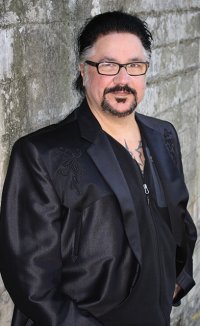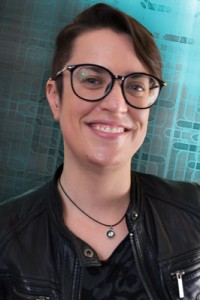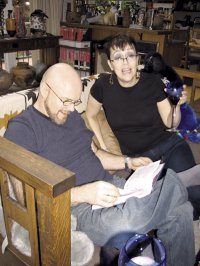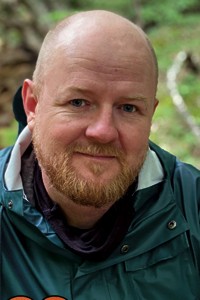Richard Kadrey: Running with the Devil
 Richard Albert Kadrey was born August 27, 1957 in Brooklyn NY. He spent ten years there, and the next ten years in Houston TX. He briefly attended college before working a wide variety of jobs, including running a jewelry store, and working in numerous warehouses and department stores, driving forklifts and ‘‘moving stuff around.’’ He’s also been a rock musician and magazine editor, and hosted live interview show Covert Culture online in the ’90s. In addition to writing fiction, he is also a prolific photographer and freelance non-fiction writer.
Richard Albert Kadrey was born August 27, 1957 in Brooklyn NY. He spent ten years there, and the next ten years in Houston TX. He briefly attended college before working a wide variety of jobs, including running a jewelry store, and working in numerous warehouses and department stores, driving forklifts and ‘‘moving stuff around.’’ He’s also been a rock musician and magazine editor, and hosted live interview show Covert Culture online in the ’90s. In addition to writing fiction, he is also a prolific photographer and freelance non-fiction writer.
Kadrey’s first SF story was ‘‘The Fire Catcher’’ in Interzone (1985). Other notable short stories include Interzone Readers’ Poll winner ‘‘Goodbye Houston Street, Goodbye’’ (1987) and British SF Award finalist ‘‘The First Man Not to Land on the Moon’’ (1997). His 1998 story ‘‘Carbon Copy’’ was adapted as film No Ordinary Baby (AKA After Amy, 2001). He wrote graphic novel Accelerate (2007).
Cyberpunk novel Metrophage: A Romance of the Future came out in 1988, followed by SF novel Kamikaze L’Amour (1995). Novel Blind Shrike (2005) appeared in online magazine Infinite Matrix, and was substantially revised for publication as Butcher Bird (2005). Kadrey returned to some of the same themes for Sandman Slim (2009), about a man who escapes from Hell to take revenge on those who betrayed him. The character’s story continues in sequels Kill the Dead (2010), Aloha from Hell (2011), and Devil Said Bang (2012), with more volumes forthcoming; a feature film is also being developed.
A prolific freelance writer, his articles appear regularly in various publications, including Science Fiction Eye, Whole Earth Review, Salon, the San Francisco Chronicle, and many others. He was an editor for magazines Shift, Future Sex, Signum, and Stim, and his non-fiction works include The Covert Culture Sourcebook (1993), The Covert Culture Sourcebook 2.0 (1994), and The Catalog of Tomorrow (2002). Kadrey is also an occasional artist, with published work including the cover for Interzone #9 (1984) and artwork for poet Lee Ballatnine’s chapbook Dream Protocols (1992). He illustrated his own story ‘‘Angel Scene’’ (2003), published dos-à-dos with ‘‘Teeth and Tongue Landscape’’ by Carlton Mellick III. Kadrey is an active photographer, specializing in glam and fetish photography.
Kadrey lives in San Francisco CA.
‘‘It’s funny – I never think of the Sandman Slim books as horror. (I still need somebody to sit down and explain which are the horror parts.) Lots of other people do. But the standard horror format is to establish normalcy, have it slowly break down and then introduce the monster or the horrors. My work doesn’t do that. I start with the monsters right in the mix. That’s one of the things I admire about Clive Barker. He placed his monsters front and center, and I always loved that. I like to make the monsters central figures in my own work, probably because I identify more with the monsters than I do with the regular people.
‘‘There’s a long history. I had a novel called Blind Shrike, and I was just giving that away, because I had a hard time selling it. It was that classic thing where editors wanted to buy it, and then people up the line said, ‘Oh, we don’t know how to market this.’ Out of annoyance or bullheadedness, just said, ‘I’ve written a book, and I’m not going to leave it gathering dust on my harddrive.’ That’s what I did with Blind Shrike: ‘Here’s a PDF. Download the book, have fun, don’t sell it.’ Then I rewrote that considerably, and it became Butcher Bird, and Night Shade published it.
 ‘‘I’ve said on more than one occasion that I consider Sandman Slim a kind of sideways sequel to Butcher Bird, a much wider, more sophisticated take on a lot of the same ideas. It has many of the same themes: the notions of Heaven and Hell, the positions of Lucifer versus God, mortals’ relationship to the afterlife and to other powers that are beyond them. So Sandman Slim is a thematic sequel, though not a literal sequel. Spyder Lee from Butcher Bird does not live in the same universe as James Stark from Sandman Slim.”
‘‘I’ve said on more than one occasion that I consider Sandman Slim a kind of sideways sequel to Butcher Bird, a much wider, more sophisticated take on a lot of the same ideas. It has many of the same themes: the notions of Heaven and Hell, the positions of Lucifer versus God, mortals’ relationship to the afterlife and to other powers that are beyond them. So Sandman Slim is a thematic sequel, though not a literal sequel. Spyder Lee from Butcher Bird does not live in the same universe as James Stark from Sandman Slim.”
…
‘‘The inspiration for the basic subject matter in the series came from George W. Bush. Seriously. Bush was president, and the fundamentalists were in office, and I could not get my head around who these people were. So I decided to read up, and try to understand evangelicals. I started reading the history of the Church, Christianity, going back as far as I could. And reading that stuff, you find out what a mess it is. Then you start reading all the heretical stuff you and find out how much has been edited out of the King James Bible most people use.
‘‘Then you have books like Bart Ehrman’s Misquoting Jesus. This is a guy who can read old Greek and ancient Hebrew, was literally going through versions of the Bible saying, ‘That doesn’t make any sense. That’s a bad translation.’ He can go through medieval Bibles and find mistakes, contradictions, and show how those mistakes and deliberate edits changed doctrine over time.
‘‘Inevitably all this leads you to researching the origins of Evil in the Western world. I have a whole library of books on Hell and devil. I hope no cops wander into my office, because they’re going to see a solid line of the Devil across this one shelf, right at eye level!”
…
 ‘‘The original idea for the Sandman Slim series was for three books, with a very specific ending, though one that somewhat open. We could have stopped there, but I wanted to go on – and then luckily, happily, Voyager wanted me to go on. When I wrote Sandman Slim, I had no idea how to write a series, no concept whatsoever. My editor, Diana Gill, helped me a lot with technical things like, ‘Reveal this, save that for Book 2.’ As a writer who had always done one-off novels, at first thinking of the plot in those terms was frustrating. But the reality is that in a series, you have to let the plot play out over longer stretches of narrative. When I started working on the second book, Kill the Dead, I realized how great it was to have pushed back the reveal of something simple, like the identity of Stark’s father. So I’ve been learning how to do that, and finding it quite fun now. The third book, Aloha from Hell, came out last year. The fourth, Devil Said Bang, came out in August, and there are going to be at least two more books.”
‘‘The original idea for the Sandman Slim series was for three books, with a very specific ending, though one that somewhat open. We could have stopped there, but I wanted to go on – and then luckily, happily, Voyager wanted me to go on. When I wrote Sandman Slim, I had no idea how to write a series, no concept whatsoever. My editor, Diana Gill, helped me a lot with technical things like, ‘Reveal this, save that for Book 2.’ As a writer who had always done one-off novels, at first thinking of the plot in those terms was frustrating. But the reality is that in a series, you have to let the plot play out over longer stretches of narrative. When I started working on the second book, Kill the Dead, I realized how great it was to have pushed back the reveal of something simple, like the identity of Stark’s father. So I’ve been learning how to do that, and finding it quite fun now. The third book, Aloha from Hell, came out last year. The fourth, Devil Said Bang, came out in August, and there are going to be at least two more books.”
…
‘‘I was a petty criminal when I was a kid. I got away with a hell of a lot, and I put myself in some weird situations and walked away unscathed. Looking back, I go, ‘What the hell was I thinking?’ Having ridiculous, movie-like moments in your life, like when you don’t realize this guy on the sofa has a kilo of heroin in his bag. As I walked out the back door of his house, cops were walking in the front door…. I got away with stuff, just by stupid luck.
‘‘I had these dual lives. I was always attracted to different groups of people. When I was young enough and naive enough, I tried to mix them together (the smart kids in school, and my little criminal friends) until I learned they don’t mix. So I ended up with dual lives and ways of being and speaking around different groups. I sort of became different people. I learned how to tell some stories and how to lie. That was probably helpful to becoming a writer: learning how to be fast on your feet with the right story at the right time.”







Pingback:#FridayReads – 5.Oct.2012